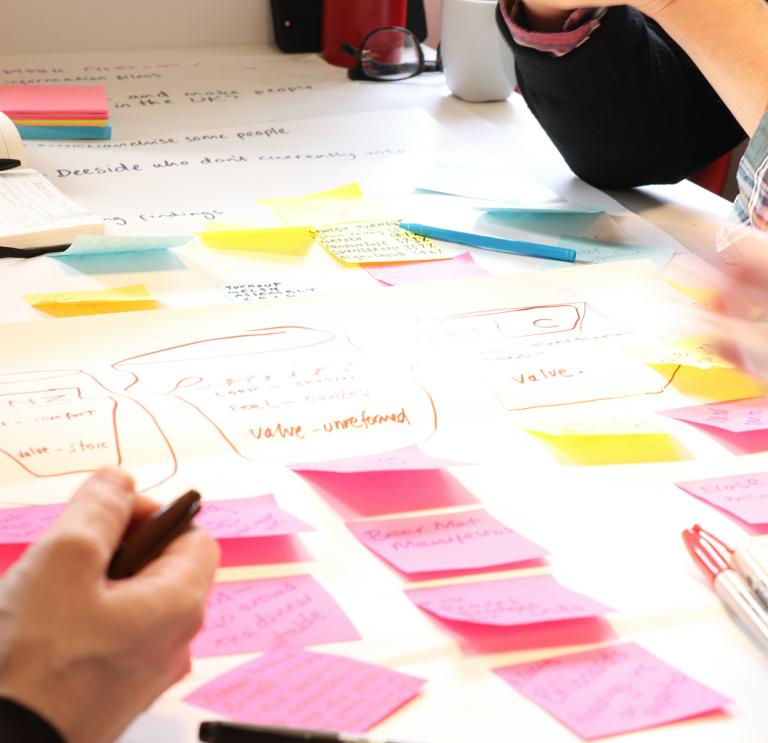To boost the creative industries in Wales, we must be bold. It’s only through constant innovation that we can keep pace with the cultural and technological possibilities across our creative sectors. This is why, here at Creative Wales, we champion research and development.
Across our nation, there are new and exciting creative projects emerging every single day – each helping to drive our industries forward and build on success. We’ve rounded up four of those initiatives, where new thinking has the potential to make a big impact.
A joined-up media strategy
First up, it’s media.cymru. Its mission is to push forward growth in the Welsh media sector. Led by Cardiff University, it’s a major strategic investment programme that links up 24 partners from the creative industries, academia, technology and local leadership.
It has some big ambitions, promising to drive sustainable economic growth, address skills needs, support the most innovative businesses and create hundreds of jobs. The £50million programme, co-funded by Creative Wales, also has a big goal – to achieve an additional £236million GVA (gross value added) over five years.
With a wide remit, media.cymru will develop opportunities in sustainability, bilingual production, diversity and inclusion, tourism and technology. It will also establish new infrastructure, including a virtual studio, and a Wales-wide R&D pipeline to turn the most innovative ideas into marketable products and services.
Developing sustainable production
Did you know Wales is committed to growing our film and TV production sector in a sustainable way? Introducing The Screen New Deal: Transformation Plan – a major initiative aiming to put a wide range of environmental recommendations into action. It’s an essential step on the way to a zero-carbon, zero-waste future in the sector, aligned with wider net-zero targets.
The Screen New Deal report of 2020 looked at the carbon impact of production and drafted a blueprint for addressing it. In February 2022, BFI and BAFTA albert – the main industry sustainability body – chose Wales as the first part of the UK to act on the recommendations. This followed a successful bid by Creative Wales and delivery partners Clwstwr and Ffilm Cymru Wales.
The programme’s first year focused on data collection, which then informed the plan’s development moving forward. Information will be shared with screen industry clusters in other parts of the UK, helping them in their own efforts to achieve these ambitious environmental goals.

Putting film fans in the frame
We have been proud to support Clwstwr, an initiative that placed innovation at the core of media production in Wales. Its funding has enabled many businesses in Wales’ creative industries to bring new and imaginative projects to life.
They include Reel Reality, a free app developed by Cardiff’s edge21 Studio in association with Sugar Creative. Using a mobile device, users can explore locations that have appeared in some of Wales’ best-known film and TV productions.
The app uses AR and a range of immersive technologies to connect audiences with content in real locations. Some information and images can be accessed from home, but users are invited to explore the locations themselves to unlock exclusive video content and activate their own personal AR film set builder.
Software that’s set for success
There’s no denying that designing film sets can be a meticulous, costly and time-intensive process. With support from Clwstwr, Cardiff creative studio Painting Practice has developed Plan V – powerful pre-production software that uses VR to streamline the process.
With Plan V, filmmakers have access to a ‘virtual studio’, in which they can remotely explore a 3D environment. You can experiment with different lenses, cameras, lighting and other options, and the software doesn’t require specialist knowledge of 3D applications.
Painting Practice’s software also shortens the timeline between scriptwriting and set building, letting users make tweaks to their design and see the changes in real time. This has the potential to reduce costs and increase production efficiency. What’s more, the toolkit is available free of charge, putting it within reach of freelancers and students as well as professionals.
Looking to find out more about research and development projects happening across Wales? Head to our dedicated R&D page to read more.
